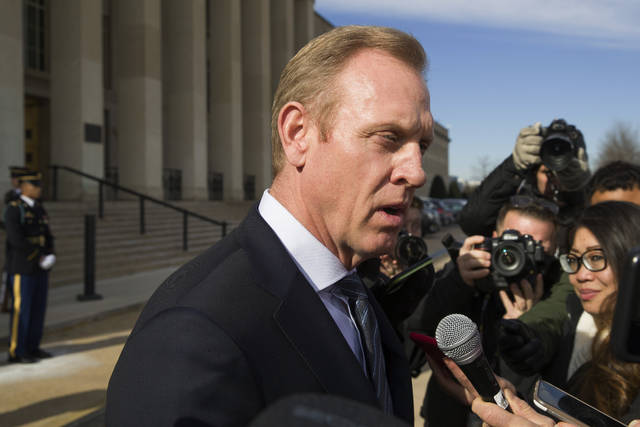KABUL, Afghanistan— At an extraordinary moment in Pentagon history, a former business executive with little political stature and without military experience is making his international debut as the acting U.S. secretary of defense.
After conferring Monday with Afghan leaders and American military commanders and diplomats in Kabul, Pat Shanahan was scheduled to attend a NATO defense ministers meeting in Brussels and an international security conference in Munich, Germany. It was Shanahan’s first-ever visit to Afghanistan, where American troops have been at war for 17 years and the Trump administration is pushing for a peace deal with the Taliban.
Shanahan’s performance on the global stage could influence whether President Donald Trump elevates the longtime Boeing executive from his uncertain status as interim Pentagon leader to be the administration’s nominee to replace Jim Mattis. The retired Marine general quit in late December in protest of Trump’s policies.
In his resignation letter, Mattis offered to stay on until after this week’s NATO meeting to ensure that the Pentagon’s interests were “properly articulated and protected.” But three days after Mattis gave Trump that letter, the president on Dec. 23 told Mattis to leave the Cabinet on Dec. 31. This unusually sudden transition came at sensitive junctures in Syria, where Trump has ordered a U.S. troop withdrawal, and Afghanistan, where a potential troop pullout looms amid continued Taliban violence.
The status of U.S. forces in Iraq also has been put in question as Iraqi leaders responded with anger to Trump’s statement in early February that he would keep American troops in Iraq in order to watch neighboring Iran. Trump had earlier angered Iraqis by saying he would use Iraq as a base to strike Islamic State targets inside Syria.
It is extraordinary for the Pentagon to be run by an interim leader and even rarer that the leader is a career defense industry executive. Shanahan is only the third person to serve as acting defense secretary and the first in 30 years. The last was William H. Taft, who served for two months in 1989 after President George H.W. Bush’s first choice to be defense secretary, John Tower, became mired in controversy and ultimately failed to be confirmed by the Senate. Dick Cheney, the future vice president under President George W. Bush, then was nominated and confirmed.
Shanahan is the first to undertake an international trip while serving as acting secretary, according to Pentagon spokesman Chris Sherwood.
No one has been nominated to succeed Mattis. Nor has anyone been nominated to succeed Shanahan in his previous role as deputy defense secretary. The Pentagon’s budget chief, David L. Norquist, has been “performing the duties” of the deputy secretary since Jan. 1.
Presidents typically take pains to ensure the Pentagon is being run by a Senate-confirmed official, given the grave responsibilities that include sending young Americans into battle, ensuring the military is ready for extreme emergencies like nuclear war and managing overseas alliances that are central to U.S. security.
Trump, however, seems in no hurry to end Shanahan’s limbo status.
“I like acting,” the president said Jan. 6. “It gives me more flexibility.”
He did not explain what he meant, but the implication was that he can keep Shanahan on a string and not immediately seek the advice and consent of the Senate. Mattis sought a certain independence from the White House, which seemed to irritate Trump.
Shanahan told reporters on Jan. 29 he isn’t thinking about how long he might keep his “acting” status, jokingly adding that his mother each morning sends him a “pray” emoticon.
Trump has publicly praised Shanahan several times, suggesting he favors keeping him on.
“Patrick has a long list of accomplishments” during his tenure as deputy defense secretary, Trump tweeted on Dec. 23. Mattis’ resignation from three days earlier had implicitly criticized Trump’s unwillingness to stand up to Russia and his inclination to disrespect America’s longtime allies.
“We have a wonderful man in there now,” Trump said on Dec. 25 during a visit to Iraq when a reporter asked if he had a timeline for nominating someone to succeed Mattis. Trump praised Shanahan profusely, noting his reputation at Boeing for managing costs and rescuing a troubled Dreamliner 787 program.
“He could be there for a long time,” Trump said, adding, “I’m in no rush.”
Although Trump cites Shanahan’s Boeing experience, Shanahan’s link to one of the nation’s biggest defense contractors is not universally praised. During Shanahan’s confirmation hearing in 2017, Sen. John McCain, then chairman of the Senate Armed Services Committee, sternly cautioned him about what McCain and others saw as the danger of an overly cozy connection between the Pentagon and its defense contractors.
“I am concerned that 90 percent of defense spending is in the hands of five corporations, of which you represent one,” McCain said. “I have to have confidence that the fox is not going to be put back into the hen house.”
Shanahan won confirmation by a vote of 92-7. One senator, McCain, did not vote.



